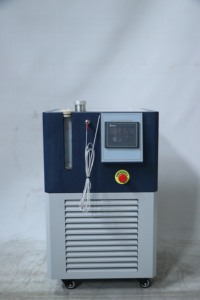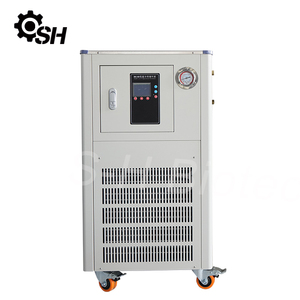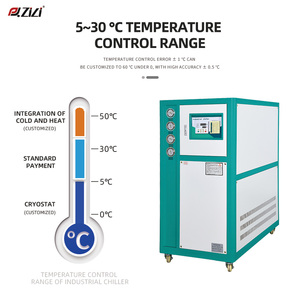(224 products available)


































































































































































































































Lab glycol chillers can be divided into several types based on their construction, cooling capacity, application fields, and other aspects.
By construction
As per the method of installation in laboratories, there are two main types of lab glycol chillers: tabletop and floor-standing chillers. Also known as bench-top chillers, tabletop glycol chiller units are generally compact and occupy less space. They are suitable for small-scale applications that need limited cooling capacities. On the other hand, floor-standing glycol chillers have larger footprints and provide higher volumes of cooling power. They also feature more advanced technology and typically come with more customizable options.
By the way of operation
There are also two main types of lab glycol chillers as per their working methods: inline chillers and recirculating chillers. Inline lab glycol chillers are directly attached to the equipment or storage containers that need to be refrigerated. They are usually integrated into other machines or devices, like centrifuges and fermentors. Inline glycol chillers can provide localized cooling solutions for specific instruments. On the contrary, a recirculating glycol chiller utilizes a reservoir to circulate the coolant through a closed-loop system.
By cooling capacity
Glycol chillers can be small, medium, or large, depending on the volume and concentration of the glycol solution they handle. Small glycol chillers are typically used in microbreweries, wineries, and classrooms. Medium-sized ones are ideal for supermarkets, restaurants, and food processing factories. Large glycol chillers are usually applicable in chemical factories, oil extraction companies, and construction facilities.
By application
Lab glycol chillers are also categorized as per their application fields. In the medical and healthcare field, lab glycol coolers are mainly used to maintain the temperature of medical equipment, medicine, and healthcare devices. Refrigerators and incubators for laboratory animals and biological samples also need glycol coolers to regulate their temperature. Lab glycol chillers find extensive use in the pharmaceutical industry. They are extensively used in fermentation, crystallization, and separation processes.
When it comes to lab chillers, some specifications need to be looked at to ensure the chiller works well without any breakdown. If one is looking to buy a lab glycol cooler, it's best to look at the following specifications.
For optimum performance from the chiller, consistent maintenance and servicing are crucial. To maximize uptime, it's best to look for a maintenance plan. Regular check-ups will ensure that there are no issues with the machine or any need for spare parts that can be supplied regionally.
Some tips for ensuring the machine is long-lasting are as follows:
The laboratory glycol chiller is useful in different industries, such as pharmaceuticals and food. Below are some application scenarios where glycol chillers are used:
General laboratory
Many labs have to maintain a variety of chemicals and samples at stable temperatures to ensure their integrity. A lab glycol chiller is able to provide this precise temperature control. Furthermore, there are a number of devices in the lab that need to be cooled. These include spectrometers, centrifuges, and refrigedrators. A glycol cooler can assist these devices by providing the constant coolness they require.
Pharmaceuticals
In the pharmaceutical industry, glycol chillers are used to help with the process of making drugs as well as to control the temperature in storage facilities. Plus, the cold liquids can be used to help reduce reactions in chemical processes and to manage the temperature in centrifuges, reactors, and other equipment.
Food and beverage processing
Glycol chillers are useful to control fermentation and brewing processes during the making of alcohol. In addition, they play a big role in food processing, where they help with freezing, cooling, and temp control. Plus, sterilization and pasteurization are also processes that glycol chillers can assist with.
Clinical and medical
Chillers are used in medical institutions. For instance, they help regulate temperature in diagnostic machines like MRI and CT scans. Also, in hospitals where there are patient wards and operating rooms, glycol coolers are used to maintain the air conditioning and ventilation system at a constant temperature.
Biotechnology
Glycol chillers are used in the biotechnological field to assist with a number of temperature-dependent procedures like fermentation, cell culturing, and enzyme reactions. These processes require a precise temperature control system. Storage is another area where glycol chillers are used. The coolers ensure that biological samples like DNA, RNA, cells, and tissues are preserved under stable temperatures.
Chemical industry
In the chemical industry, process cooling is essential. This is because many chemical processes require temperature control to ensure their success. Some of the processes that need cooling include reactions, separation, and distillation. Furthermore, chemical industries use glycol chillers to cool chemical reactors, condensers, and exchangers.
Laser and optics
Glycol chillers are commonly used in laser systems. For example, they are used in cooling laser generators and laser analyzers. Some optical devices also use a glycol cooler as a way of ensuring stability and precision. These devices include spectrometers and chromatographs.
Cooling capacity needs:
Before purchasing a glycol chiller, first determine a machine's optimal operating temperature range and cooling capacity. Perform a thorough assessment of the laboratory equipment or process that the glycol chiller will be coupled to or cool. Analyze the heat load the item generates while in use. To ensure precise equipment selection, consider factors such as the amount of equipment being cooled, the amount of heat each piece produces, and the desired cooling rate. Once the cooling capacity needs are established, a buyer may compare different types of chillers to select the one that meets its laboratory's capacity requirements.
System compatibility:
Glycol chillers are designed to work with certain systems, such as cooling towers, condensers, or heat exchangers. Buyers must ensure that the chiller they select is compatible with the system they use in their laboratory set-up. Also, consider the type of refrigerant the chiller uses. Make sure it's a substance that's acceptable and compliant with the laboratory's standards and regulations.
Energy efficiency and operational cost:
Opting for a high-performing, energy-efficient lab glycol chiller can help to minimize operating costs in the long run.
Chiller design and build quality:
Considering a chiller's construction methods and material helps ensure it has a long lifespan and operates reliably and successfully.
Q1: What is the main difference between a chiller and a cooler?
A1: A cooler is generally used to hold items, while a chiller actively reduces and maintains temperatures using refrigerants.
Q2: What are some benefits of using a glycol chiller?
A2: Lab glycol chillers have high heat transfer rates and can maintain low temperatures even in high-capacity units. Their durability and versatility make them suitable for various industrial applications.
Q3: What are some drawbacks of glycol chillers?
A3: The initial costs are higher than that of water chillers. There is also a risk of the refrigerant leaking into the environment, and operating a chiller with low glycol levels can result in equipment damage.
Q4: How long do glycol chillers last?
A4: With good maintenance practices, these machines can last at least 15 years or even up to 20 years.
Q5: Can a damaged glycol chiller be repaired?
A5: Yes. If there are damages to the condenser, evaporator, compressor, or even the glycol pump, the chiller can be repaired. However, the damages must be assessed by a professional and with their advice, the machine can be taken for repair.